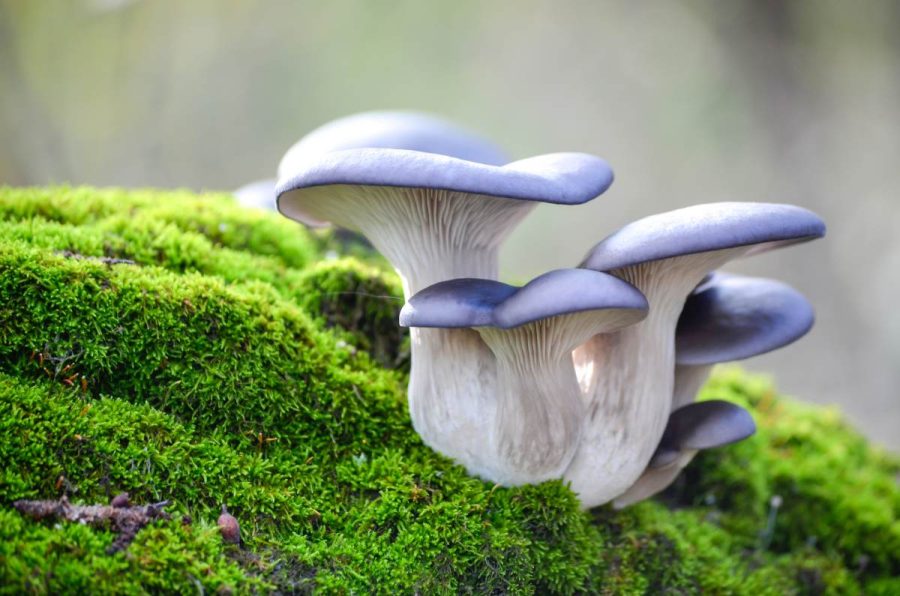More To Know About Mushrooms
February 16, 2023
Mushrooms are taking the world by storm. From mushroom teas to The Last of Us, mushrooms are making a name for themselves in the mainstream. However, mushrooms are so much more than a design on your hoodie, they have the power to change our world.
Fungi is not a plant nor an animal, but instead has its own kingdom of complex organisms. In elementary school we learned that they are decomposers who live off of dying plants and animals, but they have so much more potential than just sitting on rotting trees. Artists, Jae Rhim Lee, took inspiration from mushrooms to create an eco-friendly alternative to traditional burials. Rather than using a coffin, she designed a suit for people to be buried in. The Infinity Burial Suit is packed with safe, common mushroom spores that will help the body decompose, spread biodiversity, and limit the adverse effects of burials.
Dead things aren’t the only things mushrooms can decompose. Mycologists have discovered multiple species of fungi that can decompose human waste such as oil spills and plastics. The Pestalotiopsis microspora fungus can break down polyurethane, a common plastic used in everyday products. Sadly, the fungus is quite rare and deforestation of their native Amazonian rainforest puts their population at risk. The pestalotiopsis microspora has the potential to clean up waste left behind by humans and landfills. Scientists hope to grow it in controlled environments so they can be used on a larger scale. Not only can mushrooms eat plastic, but they can also replace it. A company by the name of Ecovative created a mushroom alternative for plastic packaging products like bubble wrap and styrofoam packing peanuts. The fungi are completely safe and effective and safe to dispose of at home.
Plastic is just one of the major products going to landfills, the global fashion and textile industries throw out about 92 million tonnes of textile waste per year. Clothing made from natural fibers will naturally decompose much quicker than most trash: cotton may take up to a year to decompose, linen a few weeks, and wool lasting a whopping 1-4 years. Synthetic fibers are what consumers need to worry about. According to sustainablechoice.com, nylon clothing can take 200 years to break down. As it degrades, microplastics enter the soil and create future health risks. Instead of letting our clothes outlive generations, MycoTEX and other companies have been using bio-fabrication to create mycelium fabrics. The fabric is 100% biodegradable and has even been used to make faux leather. There are zero additives, are water-resistant, and even fire-resistant. Sadly, mycelium fabric still has some ways to go and isn’t available to the public but will hopefully be making more appearances.
Not only can mushrooms provide environmental care, but also healthcare. Mushrooms are now included in skin care products, vitamin supplements, coffee, and teas so more people can experience the benefits of mushrooms. Lion’s mane is one of the main mushrooms featured in these products. The lion’s mane mushroom has been used for centuries in traditional Chinese medicine. It contains two primary compounds that stimulate neurogenesis, meaning that mushrooms can help the growth of neurons and brain cells. Scientists are even researching how lion’s mane can potentially help patients with Alzhiemers.
Fungus has slowly been incorporated into medicine after the discovery of antibacterial properties but also have been used for psychiatric medicine. The University of Southern Florida tested the effects of psilocybin combating mental illness. The University trained rats to associate a sound with pain until the rats felt stress everytime they heard the sound. This was to represent PTSD in humans and how our brains react to trauma. After the mice had been microdosed with psilocybin, their brains were able to disconnect the sound from the trauma, proving that psilocybin has the potential to be used for mental illness and PTSD therapy.
Mushrooms have unlimited applications and abilities. They can clean up our world and provide new and better alternatives to the problems killing our planet.
Don’t go harvesting mushrooms if you don’t know what you’re looking for, some of the coolest looking mushrooms are the most dangerous. There are also a lot of friendly looking mushrooms that are poisonous, many mushrooms are named fools or false because they look very similar to friendly edible fungi.


